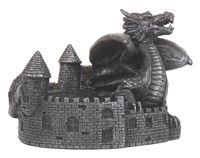Happily Ever After
by Ginny Morris - December 20, 2011
 The fairy tales all end the same way. But in real life, there’s more to the story.
The fairy tales all end the same way. But in real life, there’s more to the story.
It’s the classic ending:
The ugly dragon slain at last, Eleanor ran into Charles’s arms, sobbing in relief. “I knew you’d come for me,” she smiled, the pale light of dawn illuminating her lovely face.
“I’d face anything for you, my love,” he told her tenderly as he helped her onto his white steed. As they galloped off into the morning sunrise, a great feeling of peace and joy enveloped them, knowing they had triumphed over evil and won against all odds.
They lived happily ever after. The End.
We’re all familiar with the scene above in one form or another. It’s the ending of a classic fairy tale. The bad guy dies; the hero gets the girl; everyone’s happy. And then the classic phrase: “They lived happily ever after.”
That’s it. The rest of the heroes’ lives are summed up in five words. The implication here is that, after combating the forces of evil and pulling off a stunning victory against impossible odds, the heroes meekly settle down to live out their lives ruling their kingdoms, attending balls and playing croquet.
It might as well say, “After doing these incredible things, our heroes lived out their lives and did nothing else remarkable. The End.” These people were apparently rather ordinary except for that one flash of brilliance.
Christians can’t coast
What about you? “Me?” you ask. “What an absurd question! I’m certainly no hero. This is all very nice, but how could any of this apply to me?”
 While you may not have been out scaling castle walls or battling dragons lately, you can still learn from those who did.
While you may not have been out scaling castle walls or battling dragons lately, you can still learn from those who did.
When we finish doing a hard thing or facing a difficult trial in our efforts to serve God, we can often lose our focus. We can step back, take a deep breath and relax. However, when we do that, we minimize the lessons learned from such an experience and can stop growing. Instead of living the active Christian life God desires, we can coast for too long on that good deed or hard thing we did.
We can allow ourselves to focus on that one noteworthy thing we accomplished—that one dragon we slew—a month ago, a year ago, a decade ago. While the things we have accomplished or trials we have faced may be truly extraordinary, we simply can’t afford to rest—or feel we can ride into the sunset never to be challenged again!
Paul’s persistence
If anyone in the Bible had a right to sit back and relax after facing some incredible difficulties in service to God, it was the apostle Paul. In the list of sufferings he endured for Christ, Paul said he received 39 stripes on five occasions. He was beaten with rods three times. He was stoned once. He was shipwrecked three times. Even if Paul had retired after his first missionary journey, he still would have accomplished much more than the average believer.
Yet Paul never rested. He never concluded he had done enough difficult things in serving God; he never decided to simply retire. From the time of his conversion until his death, he never stopped doing the work God had given him to do. Paul never said, “I was stoned last month. I’m taking a few years off. I’m not going out there where they might beat me again.”
Paul didn’t let his fears cause him to coast along and avoid the challenges that serving God brings, and neither can we. We must fight our hard battles—our dragons—and trust God to help us grow and to give us the victory in the end.
We can’t allow ourselves to say, “I fought a dragon last month; I’m still resting up from that. I’ll let someone else go after that giant.” Instead, we must confidently say, “I fought a dragon last month. With God’s help, this giant will be nothing!”
Another story
God’s way of life is a happy one, and He truly does want us to live forever after. We just have to remember that no hero reaches the safety of the castle without fighting a dragon or three first. God is with us every step of the way, and He will give us the strength we need. Our part is to put our faith in Him and go forward to meet the dragon, trusting in God to help us win.
If someone were to record the tale of your moment of glory, your moment of valiant Christian character, you must not allow the end to read, “And [your name here] did no more remarkable things, and simply lived happily ever after.” No, you must live your life so that the end would read: “And [your name here] went on to live a life of service to God, did many other extraordinary things and brought great glory to God. But that’s another story.”
Ginny Morris is a high school sophomore and enjoys writing, horseback riding and reading.
For more about accomplishing great things and service, see:
Continue Reading
Guns, Germs and God
by Joshua Travers - December 13, 2011
Dealing With College and Career Worries
by Ashley Holl - November 16, 2011
